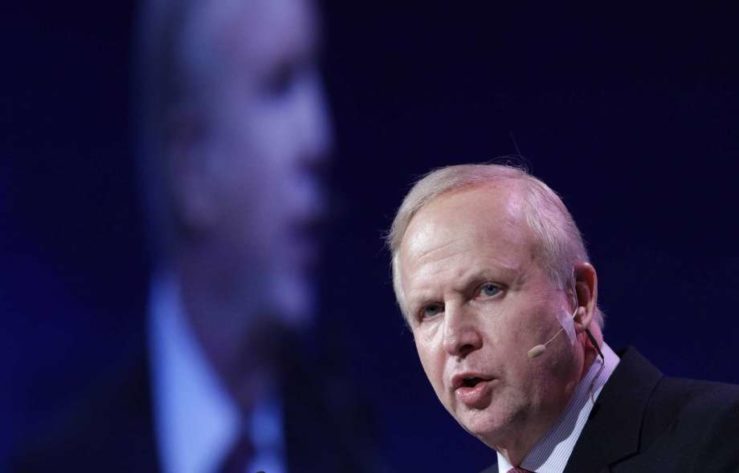The world is moving in the wrong direction in its fight against climate change, and BP Chief Executive Bob Dudley said that energy companies must step up and play their part to dramatically reduce greenhouse gas emissions.
The reality is the world isn’t even close to on track to meet the recent Paris climate accord goal of keeping a global temperature rise below 2-degrees Celsius by 2100. On the current track, global energy demand will spike by about one-third by 2040, including growing demand for crude oil and other liquid fuels before eventually plateauing, according to BP’s analysis that Dudley highlighted Tuesday at the CERAWeek conference in Houston.
“As bright as our future may seem, we are operating in a world that is not on a sustainable path,” Dudley said. “Greenhouse gases are expected to rise by about 10 percent over the next two decades, when they need to be falling dramatically.”
Dudley cited possible solutions, like federal regulators pushing the coal industry out of the power sector, and governments worldwide adopting more carbon prices, or taxes, on energy companies.
“We have to move from being pure-play oil and gas companies into broader energy businesses,” Dudley said. “Our focus has to be on developing an energy system that is cleaner, better and kinder to the planet.”
BP remains the top producer in the Gulf of Mexico with more growth on the way and, in October, BP paid $10.5 billion to buy the onshore Texas shale assets of Australia’s BHP Billiton, including sizable positions in the booming Permian Basin and South Texas’ Eagle Ford shale.
Last year, BP said it would hold greenhouse gas emissions from its operations at or below its 2015 levels in the years ahead.
While natural gas burns cleaner than oil, the challenge is ensuring that methane doesn’t leak during the drilling and production of gas. Those emissions are viewed as the Achilles’ heel of natural gas. So BP is setting a target of keeping its methane emissions down to 0.2 percent of the gas produced.
Dudley said the British energy giant must be “progressive for society and pragmatic for investors,” and nimble enough to shift as the market changes. At the beginning of this century, BP invested heavily in renewable energy, perhaps before it was economically viable.
The company lost money then. Now, it’s strategically investing again on a smaller scale.
“We continue to invest in low carbon – to the tune of around half-a-billion dollars a year – but in smaller, smarter, very focused and disciplined ways,” Dudley said.
Earlier Tuesday, Gretchen Watkins, president of Shell’s U.S. subsidiary, Shell Oil of Houston, called on the White House to tighten the rules on methane leaks from oil and gas production, rather than roll them back as proposed by the Trump administration.
“We need to do more,” Watkins said.
But some environmental groups, including Greenpeace, are calling BP hypocritical for lobbying the White House to roll back some methane emissions regulations.
BP responded that it doesn’t oppose methane regulations per se. Rather, it prefers one set of rules, instead of having to follow the different ones put in place by different agencies, in this case the Environmental Protection Agency and the Interior Department.
This article first appeared on the Houston Chronicle – an Energy Voice content partner. For more from the Houston Chronicle click here.



